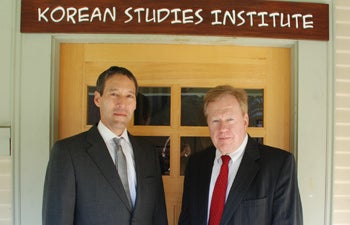Fighting for Freedom in North Korea
The United States’ turbulent relationship with North Korea spans decades with points of contention historically centered on the communist state’s nuclear programs and missile development, said Robert King, U.S. Special Envoy for North Korean Human Rights.
But concerns also focus on humanitarian conditions in North Korea.
“The objective is to begin a conversation with North Korea on human rights issues,” said King, who played an integral role in the passage of the 2004 North Korean Human Rights Act.
King described the challenges and progress being made in North Korea to USC students and the public during the event in the Davidson Conference Center.
“We are delighted Ambassador King could come,” said David Kang, professor of international relations and business and director of the USC Korean Studies Institute housed in USC Dornsife. “The North Korean case is complex and it’s very politically sensitive because this is a country that poses real national security threats to the U.S.”
“Ambassador King’s visit to USC was significant because it reminds us that Korea remains an important priority of U.S. foreign policy,” Kang said. “Being able to bring such a distinguished visitor to USC provided a wonderful opportunity for our students and the local community to interact with the Ambassador.”
The human rights ambassador for North Korea for the past two years was the fourth sitting U.S. ambassador to participate in the lecture series, sponsored by the USC Korean Studies Institute’s Sejong Society.
Human rights abuses include restrictions on freedom of speech; the press and religion; human trafficking; starvation; and media censorship, King said. The U.S. seeks to implement programs to address these issues, such as broadcasting in the Korean language to help increase the flow of information and helping North Korean refugees resettle.
Malnutrition in North Korea is also a crucial issue. But before the U.S. decides to provide food assistance to North Korea as it did during its famine in the 1990s, King must balance North Korea’s food needs with other areas of the world. The U.S. also requires a strict monitoring of food delivery to ensure it reaches those most in need.

Pictured left to right, David Kang, professor of international relations and business and director of the USC Korean Studies Institute housed in USC Dornsife, stands with Ambassador Robert King, U.S. Special Envoy for North Korean Human Rights. Photo by Ambrosia Viramontes-Brody.
King, along with non-governmental organizations, visited North Korea earlier this year to examine the conditions.
“We were not in a position to say we were going to provide aid,” King said. “We had some good discussions and talked about issues of monitoring, but we did not reach a final conclusion or agreement on all of the issues. We did at least raise the issues we needed to talk about.”
King said his exchanges with North Korean officials have been promising. In a recent talk, North Korean leaders expressed an interest in providing opportunities for Korean Americans to reunite with their families in North Korea.
“When you are dealing with human rights it is not a sudden brilliant change,” King said. “We are going to make progress on human rights by continuing to press and push and try to move forward.”
At the end of King’s trip in June 2011, North Korea responded to King’s call for the release of American citizen Eddie June Young-Su, 60, who was detained for seven months in North Korea for allegedly proselytizing in the communist nation, which is illegal under North Korean law.
“For us, that was primarily a humanitarian issue,” King said. “To the North Koreans, it was a gesture to let us know they were interested in a better relationship.”
But North Korea’s past record of reestablishing diplomatic relationships only to abandon those attempts by disobeying sanctions and testing nuclear missiles is cause for apprehension, King said.
“We continue to press day after day after day,” King said. “There are not high expectations but I think we are going to make progress.”